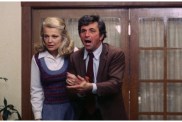Writer Jessica Ferri takes on the timely social thriller genre in the wake of the phenomenal success of “Get Out.” Read on…
All horror movies are about social tension, in a sense. One of the most popular forms in the genre is that of the city dweller finding his or herself at the mercy of the deviant country bumpkins. Think of how many films occupy that “urbanoia” headspace: Deliverance, I Spit On Your Grave, The Texas Chainsaw Massacre, Psycho, Pet Sematary, The Hills Have Eyes, and many, many more. But of course, when one talks about “social tension” in America, what we’re usually talking about (or around) is race.
Jordan Peele’s Get Out is the first film by a black writer/director to make $100 million at the box office . . . in just three weeks. Truth be told, it was nearly impossible to find a showing here in Brooklyn that wasn’t sold-out the week of its release. Obviously Peele has done what all writer/directors hope to do: he’s touched a nerve, so much so that it matters little to audiences that Get Out is classified as a horror film.

It’s horror movies like this that sometimes end up with the moniker “social thriller.” As if they’re somehow loftier, or have a higher purpose than their counterparts. Before the release of Get Out, Peele curated a series for the Brooklyn Academy of Music called “The Art of the Social Thriller.” His choices included Rosemary’s Baby, Night of the Living Dead, The Shining, Guess Who’s Coming to Dinner, Rear Window, Funny Games, Misery, The Silence of the Lambs, Candyman, Scream, The People Under the Stairs, and The ‘Burbs.
Get Out tells the story of Chris (Daniel Kaluuya), a black man who travels to his white girlfriend Rose (Allison Williams)’s parents house for the weekend. “Do they know I’m black?” he asks, shortly before they depart. Rose reassures him that her parents aren’t racists because her dad “would’ve have voted for Obama for a third term.” But once he arrives at the family seat, strange things start happening.
RELATED: How Get Out Made Me Afraid of White People
Leaving the theater, I thought how different a movie it would’ve been with a much darker ending that I know must’ve crossed Peele’s mind. George Romero’s horror classic Night of the Living Dead, for example, in which a black man suffers through the zombie apocalypse as the sole survivor only to be killed by white police officers. I thought of other films like Candyman and even Tales from the Hood which also confront race head-on.

For many years I tried to make Halloween a horror movie night at my house. It never really came together. One year I thought we’d watch Tales from the Hood. People were so upset with me that I actually had to turn the movie off. One of my friends actually wept. Later, when I brought up the incident to a friend of mine who was there, she politely scolded me, “Oh yeah, the one that begins with the black guy being brutally murdered by the police?”
In an interview with The New York Times’ Jason Zinoman, Peele says he wrote Get Out in response to “post-racial America,” in which white liberals believed that race or racism was no longer an issue because of Obama’s presidency. Hence Rose’s justification that her parents can’t be racists—if you’re cool with Obama, then you’re cool with black people in general.
Peele wrote the film imaging that the next President of the United States would be Hillary Clinton. But by the time Get Out made it to theaters, we somehow found ourselves about two months into the presidency of Donald Trump. When Zinoman asked if Peele worried if the film would still resonate, he responded: “Yes. At the same time, I feel the movie is more relevant. The liberal elite who communicates that we’re not racist in any way is as much of the problem as anything else. This movie is about the lack of acknowledgment that racism exists. In the Trump era, it’s way more obvious extreme racism exists. But there are still a lot of people who think: We don’t have a racist bone in our bodies. We have to face the racism in ourselves.”

This statement really resonates with me—and it brought me back to that moment in which I tried to show a room full of white people Tales from the Hood. What works so well about Get Out, is that it manages to put you in Chris’s shoes for the duration of the film. That’s what great horror films should do—what great films in general should do—suspend your own experience and put you deeply into the experience of the character, creating sympathy and, in the best case scenario, empathy along the way. You don’t have to be a pregnant woman to feel for Rosemary in Rosemary’s Baby. And you don’t have be black to want to scream “Get Out!” at Chris.
In a world where the rights of Muslims, immigrants, women, and black people are under direct attack from the office of the President himself, Get Out serves as a reminder that even those of us with the best intentions—the ones who say to ourselves, “Oh no, not me, I’m not a racist”—have to ask ourselves: what’s the difference between active racism and just standing by, watching it happen, doing nothing? The answer: There’s no difference at all.
READ MORE IN JESSICA FERRI’S “ON” SERIES…
My Body, My Choice: On Demonic Possession
Merry X-Mas: On Holiday Horror









